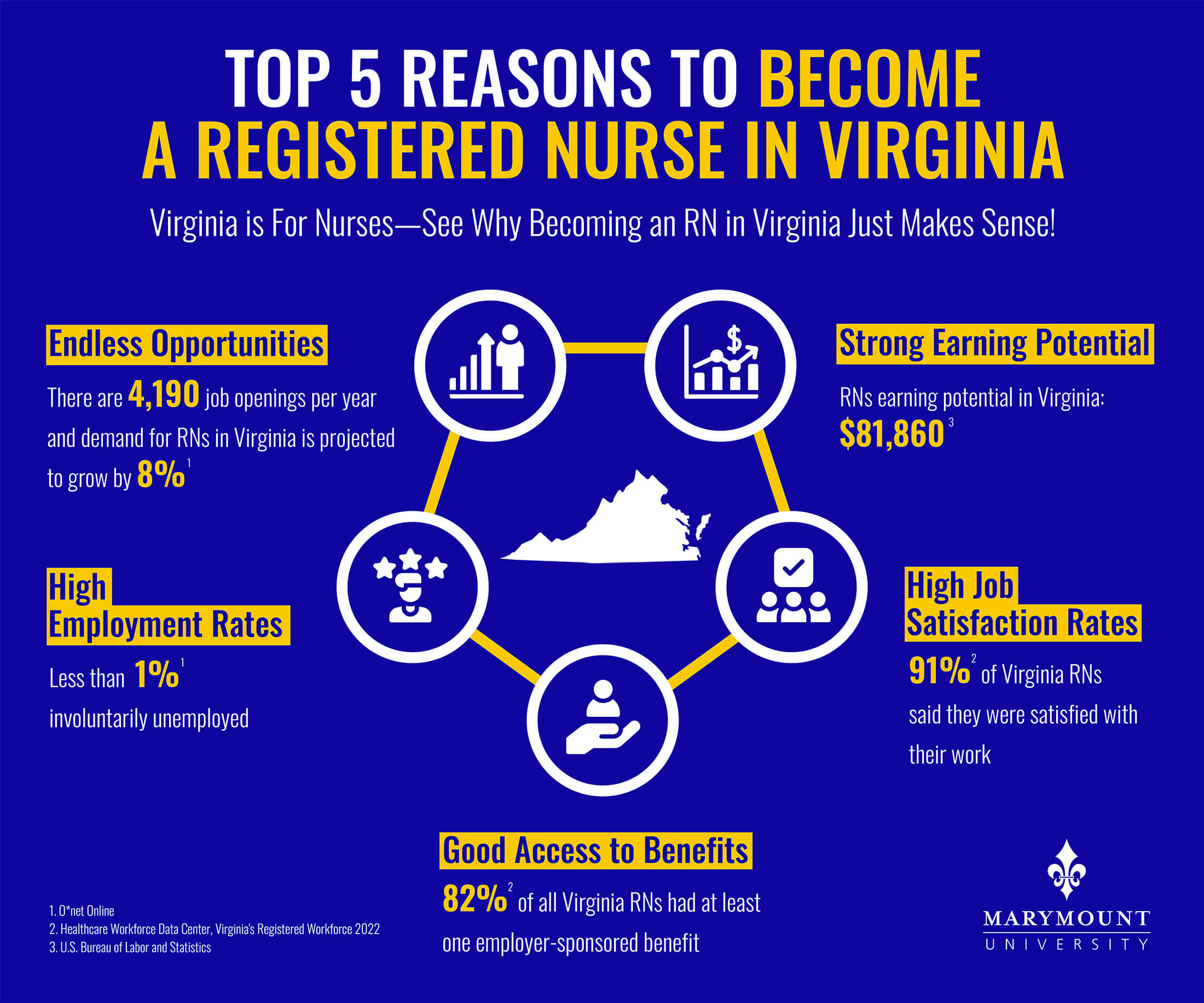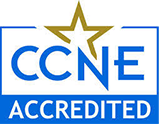Marymount Accelerated BSN Admission Requirements
The demand for skilled, caring nurses continues to grow in Virginia—and across the country. Marymount University offers one of the fastest online Accelerated Bachelor of Science in Nursing programs in Virginia (ABSN), so you can earn a BSN in just 16 months.
All applicants must have already earned a bachelor’s degree in any field from an accredited U.S. college or university as well as successful completion of prerequisite courses.
To apply, you must complete an online interview and submit:
- Transcripts with a minimum GPA of 2.8
- One letter of recommendation
- A writing sample
- Proof of residency in Virginia, Maryland or D.C.
Prerequisite courses must have been completed within the past 10 years with a grade of C or better:
- Anatomy & Physiology with Lab I (4 credits)
- Anatomy & Physiology with Lab II (4 credits)
- General Chemistry for Health Science Majors or higher-level Chemistry with Lab (4 credits)
- Developmental Psychology (3 credits)*
- Microbiology with Lab (4 credits)
- Nutrition (3 credits)
- Sociology or Anthropology (3 credits)
- Statistical Analysis (3 credits)
* Applicants must have completed a Developmental Psychology course or courses overseeing childhood to death. This can be completed in one or multiple courses depending on the institutions an applicant has attended.
The Path to Become a Registered Nurse in Virginia
Why Attend Our Online Nursing Program in Virginia?
Study wherever suits you best with 100% online coursework and attend a nearby one-week residency at our main campus in Arlington, Virginia, nestled among influential organizations and healthcare providers. Balance your coursework with clinical hours close to your home that are required to take the National Council Licensure Examination (NCLEX-RN) exam and become a licensed registered nurse (RN).
The Department of Health Professions found that nurses in Virginia have:
- A BSN degree or higher (69%)
- 91% job satisfaction
- 1% unemployment
The baccalaureate degree program in nursing at Marymount University is accredited by the CCNE.
What is the Outlook for Nursing in Virginia?
By taking this online accelerated nursing program for non-nurses, you will benefit from a career with greater job security, fulfillment and earning potential. Nurses work in many areas and specialties, including acute care settings like hospitals, surgical centers, home health agencies, schools, and nursing homes.
The U.S. Bureau of Labor Statistics ranks Virginia as one of the top-paying areas for registered nurses. Earning an annual mean salary of $92,800, RNs near Arlington and the D.C. area earn 19% more than the average nurse.
Virginia expects a 10% increase in RN jobs by 2033, according to Lightcast Labor Insights. With employment rates high above the national average, these Virginia counties had the most RN openings between 2022 and 2023: Norfolk, Richmond City, Fairfax and Chesterfield.

Clinical Placement Services
Marymount works with you to offer a high-quality placement experience in Virginia that meets the University’s clinical requirements and prepares you for success in your future practice.
01
High Placement Success Rate
Some schools put the burden of identifying preceptors and sites for clinicals on the student. At Marymount, we fully support you by providing Clinical Placement Services so you can concentrate on studying. Our talented team of Clinical Placement Specialists are highly successful at securing clinical site placements for our online nursing students.
Clinical Placement Services are provided to all Marymount online nursing students free of charge. We won’t charge you anything beyond your regular tuition and fees.
Learn More About Clinical Placement
02
Clinical Placement Made Easy
Our Clinical Placement Team coordinates all aspects of the clinical placement process to secure you a placement site and preceptor within a reasonable distance of your home. Our Clinical Placement Coordinators serve as facilitators, making the process as seamless as possible.
Their responsibilities include:
- Placement overview
- Document/clearance requirements
- Placement updates
- Student relocation compliance
- Student communications
Learn More About Clinical Placement
03
How Does it Work?
- You’ll collaborate with a Marymount Placement Coordinator, who will walk you through the process and be your primary point of contact right through to graduation.
- Based on your goals and location, the Placement Specialist will identify an appropriate site and preceptor for you.
- Our goal is to place you within a reasonable driving distance of your residence.
- You will meet all deadlines and requirements for placement through close communication and collaboration with your Placement Coordinator.
- Your Placement Coordinator will guide and support you through your clinical clearance and onboarding.
Learn More About Clinical Placement
Connect and Learn During the On-Campus Residency
The on-campus residency is an immersive experience and will engage ABSN students in hands-on learning experiences, skills training and practice including but not limited to:
- Health assessment
- Activities of daily living
- Oxygenation related interventions
- Medication administration
- Wound care
- Competency check-offs
- High fidelity patient simulation (patient simulators that talk, breathe and have changing hemodynamics based on students' response to the situation)
- Time to connect with faculty, students and the community
Online ABSN Curriculum Snapshot
For a complete list of courses and course descriptions from our online RN program, click here to access your comprehensive digital program guide.
This nursing course serves as an introduction to the professionalism and values of nursing. A historical perspective is used to provide background for subsequent study of contemporary nursing practice and research. Prerequisites: BIO 161, BIO 161L, BIO 162, and BIO 162L. Liberal Arts Core/University Requirements Designation: WI, DSINQ. (3 credits)
This course prepares students to perform a comprehensive health assessment of the adult client. Some topics explored in this course include communication and documentation, as well as ethical, spiritual and cultural considerations. Additionally, students will evaluate risk related to environmental, genetic and lifestyle factors. Course includes a laboratory component. Corequisite: NU 231. (3 credits)
This course focuses on mental health promotion and the care of clients with acute and chronic mental illness. Primary, secondary and tertiary prevention are addressed. The curriculum components of the health care system, research, education and society are addressed as these relate to mental health and mental illness. The nursing process is applied as students assess, diagnose, plan, intervene and evaluate the care of clients experiencing mental illness. Knowledge of the nurse-patient relationship is expanded as students provide client care. Course includes lecture and clinical components. Prerequisites: NU 230, NU 231, NU 302, NU 306, and NU 307. Corequisite or prerequisite: NU 308. (4 credits)
An introduction to the process of systematic investigation necessary for the continued development of the body of knowledge that forms the basis of nursing practice. The purpose of this course is to provide learners with the opportunity to systematically examine the research process, characteristics of practice-based research leading to the development of evidence-based nursing practice, and methodologies appropriate to the investigation of researchable nursing-practice problems. Emphasis is placed on guiding learners through the research process, facilitating the critical reading of nursing and related research, developing skill in identifying researchable problems encountered in the practice of nursing, and stimulating the intelligent application of research findings to nursing practice. Focus is given to the interrelatedness and interdependence of the parts of the research process and evidence-based practice issues. Prerequisites: MA 132 and NU 308. Liberal Arts Core/University Requirements Designation: DSINQ. (3 credits)
Next Application Deadline:
- Summer 2024
Next Start Date:
- September 2025
Why Choose Marymount For Your Nursing School in Virginia?
A Student-Centered ABSN
Support, speed and flexibility are essential if you are considering a second bachelor’s degree. Dr. Judith Rogers-Fruiterman shares more about the student-centered online experience at Marymount. Hear how our caring faculty and advisors prioritize online student success, mentorship and hands-on learning so you can graduate as a competent and compassionate nurse.
FAQs About Becoming a Nurse in Virginia
Aspiring nurses in Virginia need to have an Associate’s Degree in Nursing (ADN) or a Bachelor’s Degree in Nursing (BSN), as well as complete the required clinical hours. Nurses in Virginia will also need to pass the NCLEX-RN exam and apply for licensure through the Virginia Board of Nursing.
People who already have a non-medical bachelor’s degree can leverage their previous education through an accelerated bachelor’s program (ABSN). This type of program, though it requires some prerequisites, is much shorter than traditional BSN programs. It’s designed to use what you already know and put you in the nursing field much faster.
The first step in becoming an RN is completing an accredited BSN program. Recent graduates must pass a standardized exam called the National Council Licensure Examination or NCLEX-RN to obtain licensure and legally practice nursing. Requirements are defined by the Board of Nursing and vary by state.
Marymount University offers a free NCLEX-RN prep course at the end of the ABSN program.
Marymount University’s Online ABSN can be completed in 16 months, the equivalent of four consecutive semesters.
A full-time job is not recommended for ABSN students. The rigorous curriculum is like a job itself and requires full attention. Faculty estimate that it takes 8 to 10 hours of dedicated time each day to be a successful ABSN student.
For the 2023-24 academic year, the Online ABSN Program tuition is $18,700 per semester. Additional fees do apply. For more information, please visit our Tuition & Financial Aid page.
Prerequisite courses must have been completed within the past 10 years with a grade of C or better:
- Anatomy & Physiology with Lab I (4 credits)
- Anatomy & Physiology with Lab II (4 credits)
- General Chemistry for Health Science Majors or higher-level Chemistry with Lab (4 credits)
- Developmental Psychology (3 credits)*
- Microbiology with Lab (4 credits)
- Nutrition (3 credits)
- Sociology or Anthropology (3 credits)
- Statistical Analysis (3 credits)
* Applicants must have completed a Developmental Psychology course or courses overseeing childhood to death. This can be completed in one or multiple courses depending on the institutions an applicant has attended.







